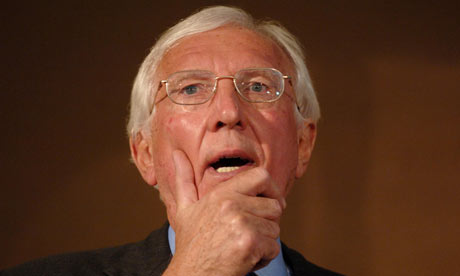Banks forced to reveal numbers of millionaire staff
New laws created in the wake of Sir David Walker's report will compel banks to say how many of their staff earn more than £1m, but 'high end' earners' names will not be revealed
Banks will be forced to reveal how many of their employees earn more than £1m a year under new laws expected to show that hundreds, perhaps thousands, of City bankers are made millionaires each year.

Sir David Walker. Photograph: /Rex Features
But in introducing legislation to adopt the key recommendations of the City veteran Sir David Walker in his 167-page report published today, the government will allow banks to keep the identity of "high-end earners" secret. Ministers had suggested the top 20 highest-paid employees should be named and shamed.
Walker, who has been reviewing corporate governance at banks since February, will disappoint those who believe the pay levels should be revealed for the current financial year, as he is not expecting the ground-breaking changes to be implemented until 2011.
He insists, though, that he is creating "a more demanding regime than that currently in place in any other major jurisdiction". Asked how many people would be revealed as earning more than £1m, he said: "Hundreds, if you are asking me, certainly, but possibly thousands.
Alistair Darling, the chancellor, welcomed the report, which calls for shareholders to adopt a new code of stewardship. He intends to call major investors to the Treasury to demand compliance.
Tonight he said: "One of the fundamental causes of the financial crisis was bad management of some our major banks. Too many people around board tables did not ask the right questions; some chief executives did not fully understand the risks being taken by their traders; pay and bonuses encouraged reckless risk-taking instead of responsible behaviour.
"Tougher regulation will help to make our system safer. But the culture of the banks themselves must change."
The Liberal Democrat shadow chancellor, Vince Cable, said the report made "a few small steps towards transparency" but nothing like enough. He added: "Transparency should relate to individuals in the way that it already does to company directors. MPs and senior BBC executives have rightly had their pay packages exposed to public scrutiny but bankers also enjoy a taxpayer guarantee. There is no justification for withholding information on individual high-end employees from the public or shareholders."
Walker wants greater emphasis on the role of chairmen and women, whom he believes should devote two-thirds of their time to the banks they oversee. However, he risks being accused of forcing up boardroom pay after conceding that chairmen could demand larger fees for the extra effort involved. Bank chairs should also stand for re-election to the board each year – more regularly than the three years currently stipulated – to make them more accountable to shareholders.
The biggest change to the interim report in July is the £1m floor for disclosure of pay, which he admits was set arbitrarily but will include more bankers than his previous level of the average pay in the boardroom, more likely to have been closer to £2m. Employees will be bracketed in bands of £1m to £2.5m, £2.5m to £5m and in bands of £5m thereafter.
He urges voluntary improvements to corporate governance and boardroom behaviour rather than reform through regulation. "Major regulatory issues need to be addressed to assure the soundness of the financial system, but there could be significant downside if the regulatory pendulum swings too far," he says. "It could harm the ability of banks to provide customers with the financial services they need and lead to substantial increases in fees and charges."
Although his report makes 39 recommendations covering areas from bolstering shareholder oversight to the way boards operate and to keeping powerful chief executives in check, the two that will shed more light on excessive City pay are the only ones that will need legislation.
Banks in the FTSE 100 and the biggest building societies would be required to disclose total pay of more than £1m split between salary, a cash bonus, deferred shares, performance-related awards and pension contributions.
To ensure that big-paying US banks such as Goldman Sachs and Morgan Stanley are included in the new requirements, he recommends that UK subsidiaries authorised by the FSA comply with any new law. These foreign-owned banks would also have to show pay received outside the UK to avoid any circumvention of the rule.
US rules require the highest-paid earners to be named regardless of whether they sit on the board, but Walker refused to adopt a similar practice for the UK. "No evidence has been produced that this would be likely to yield any enhancement in the governance of risk in major institutions," he said. Such information was known at Lehman Brothers and other US banks that ran into trouble.

No comments:
Post a Comment